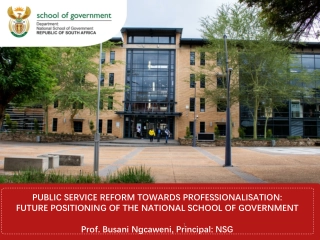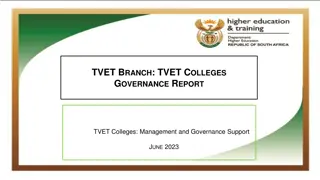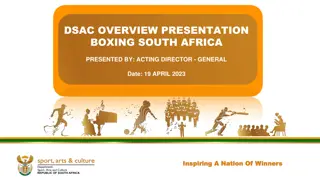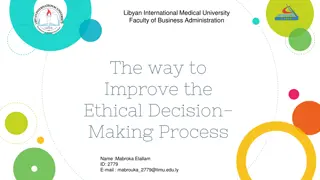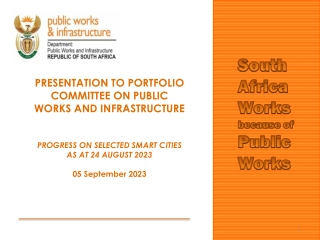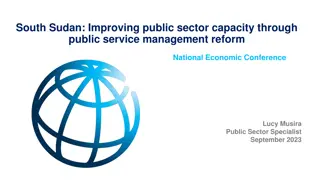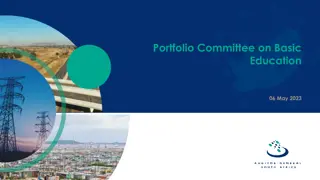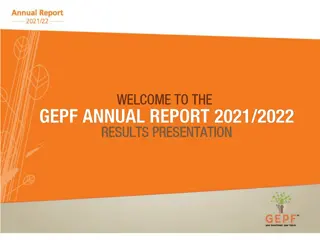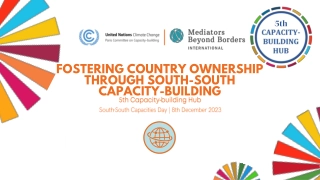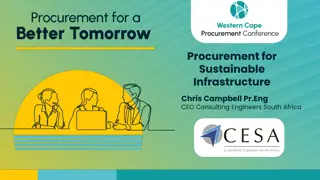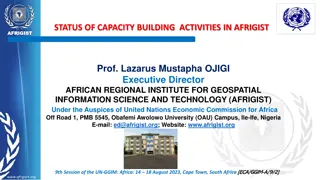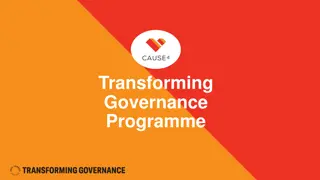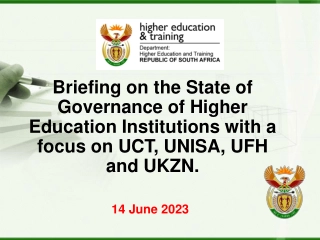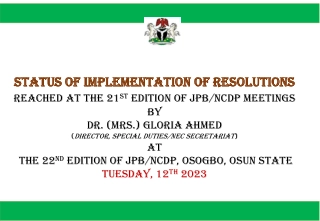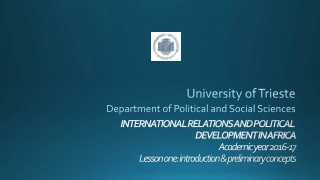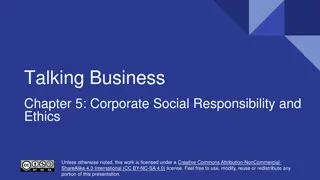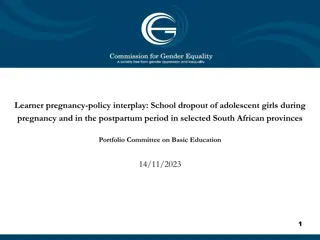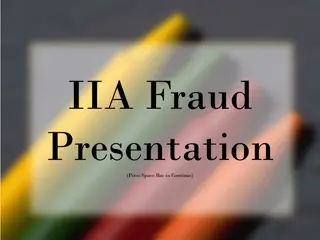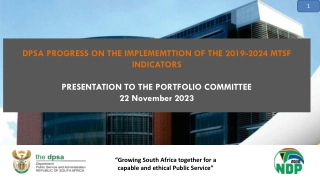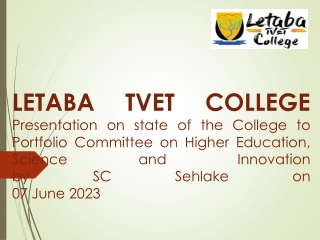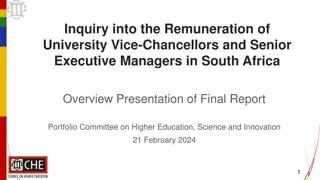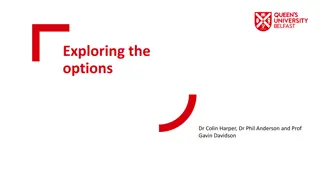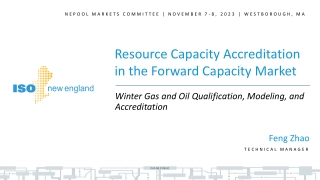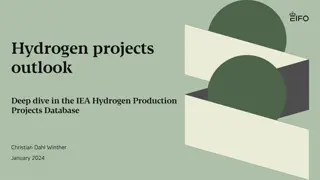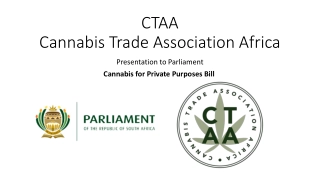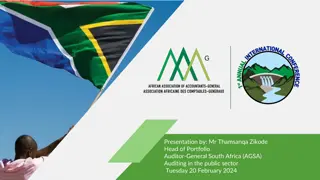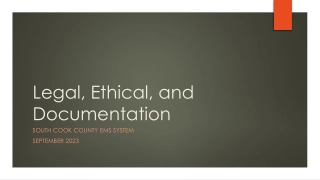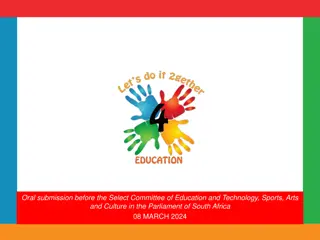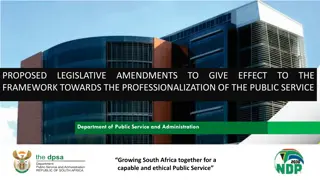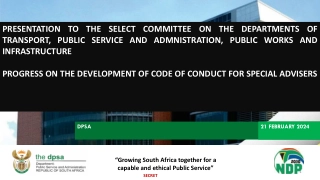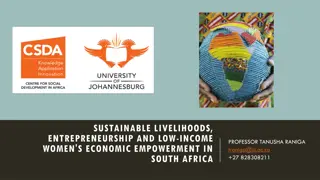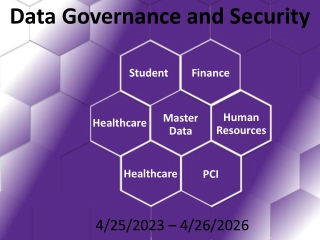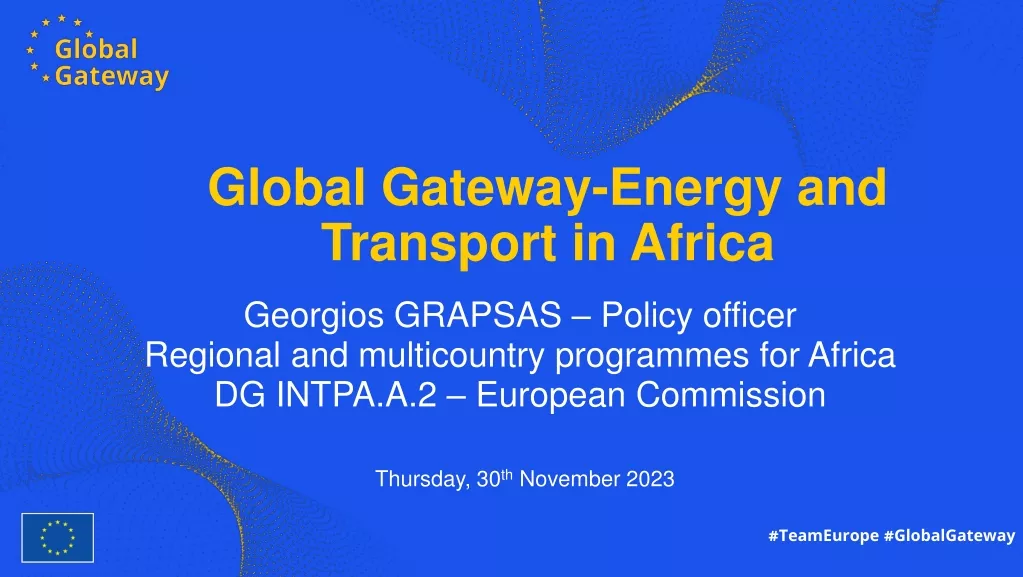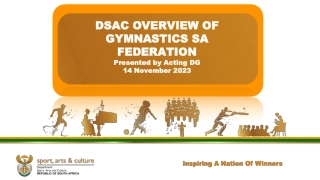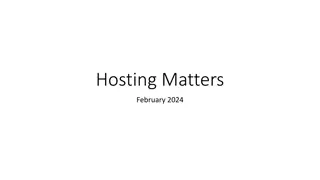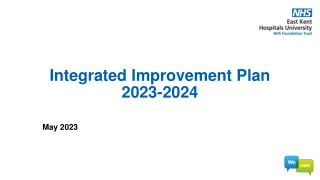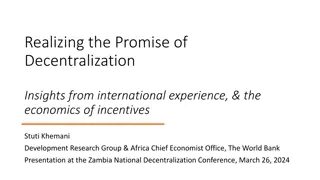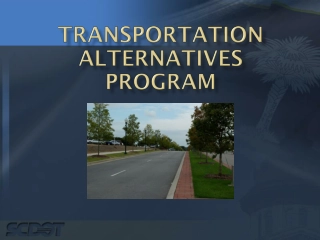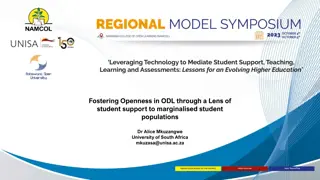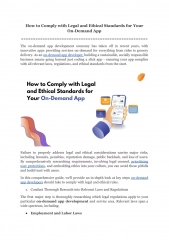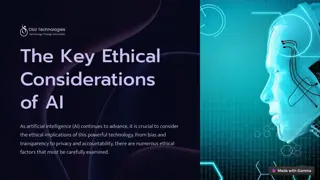Enhancing State Capacity and Ethical Governance in South Africa
The implementation progress of the Medium-Term Strategic Framework (2019-2024) by the National School of Government in South Africa focuses on building a capable, ethical, and efficient state free from corruption. The government, under President Cyril Ramaphosa, emphasizes the importance of professionalism, ethics, and capacity building in the public service to deliver on the commitment to improve the lives of the citizens. Initiatives include providing training courses on ethics, anti-corruption, senior management, and supply chain management to enhance service delivery and ensure that officials have the necessary skills and expertise. Developing a capable and ethical state is essential for meeting the developmental needs and building public confidence.
Enhancing State Capacity and Ethical Governance in South Africa
PowerPoint presentation about 'Enhancing State Capacity and Ethical Governance in South Africa'. This presentation describes the topic on The implementation progress of the Medium-Term Strategic Framework (2019-2024) by the National School of Government in South Africa focuses on building a capable, ethical, and efficient state free from corruption. The government, under President Cyril Ramaphosa, emphasizes the importance of professionalism, ethics, and capacity building in the public service to deliver on the commitment to improve the lives of the citizens. Initiatives include providing training courses on ethics, anti-corruption, senior management, and supply chain management to enhance service delivery and ensure that officials have the necessary skills and expertise. Developing a capable and ethical state is essential for meeting the developmental needs and building public confidence.. Download this presentation absolutely free.
Presentation Transcript
MEDIUM-TERM STRATEGIC FRAMEWORK (2019-2024) IMPLEMENTATION PROGRESS BY THE NATIONAL SCHOOL OF GOVERNMENT FEBRUARY 20241 Learn Grow Serve
OUTLINE OF PRESENTATION Future Positioning of the NSG towards next MTSF Strategic Alignment to MTSF Institutional Performance Successes and Key Interventions Challenges and Remedial Actions Learn Serve Grow 2
CONTEXT When I was elected to the position of President of South Africa, I said that building an efficient, capable and ethical state free from corruption was among my foremost priorities. Only development-oriented state can deliver on the commitment to improve the lives of the people ofthiscountry. a capable, efficient, ethical and This means that the public service must be staffed by men and professional, skilled, selfless and honest PresidentCyrilRamaphosa,1stMarch2021 women who are Learn Serve Grow 3
CONTEXT: PRIORITY 1 OF THE 6TH ADMINISTRATION C A PA B L E S TAT E E T H I C A L S TAT E D E V E L O P M E N TA L S TAT E A developmental state aims to meet people s needs through interventionist, developmental, participatory public administration. Building an autonomous developmental state driven by the public interest and not individual or sectional interests; embedded in South African society leading an active citizenry through partnerships with all sectors of society. An ethical state is driven by the constitutional values and principles of public administration and the rule of law, focused on the progressive realisation of socio-economic rights and social justice as outlined in the Bill of Rights. A capable state has the required human capabilities, institutional capacity, service processes and technological platforms to deliver on the NDP through a social contract with the people. Learn Serve Grow
CONTEXT: BUILDING STATE CAPACITY In improving the capabilities of public servants, the National School of Government is introducing a suite of compulsory courses, covering areas like ethics and anti-corruption, senior management and supply chain management, and deployment of managers to the coal face to strengthen service delivery SONA 2019 A capable state starts with the people who work in it. Officials and managers must possess the right financial and technical skills and expertise. We are committed to ending the practice of poorly qualified individuals being parachuted into positions of authority through political patronage. There should be consequences for all those in the public service who do not do their work. Through the ongoing and focused training of civil servants, the National School of Government will be playing a greater role in guiding career development From the desk of the President, January 2020 The Public Service is at the coalface of government, and lack of professionalism does not just impact service delivery; it also dents public confidence. Advancing honesty, ethics and integrity in the Public Service is critical to build a capable state. Through the National School of Government, we continue to roll out courses and training programmes for government officials from entry-level to senior management and the Executive SONA 2021 Learn Serve Grow 5
CONTEXT: BUILDING STATE CAPACITY Professionalising the public service involves training accounting officers across all spheres of government on the applicable legislative provisions. The National School of Government has a vital role to play in this regard. Professionalism is not only about having the right qualifications and technical skills, but also about having appropriate standards of respect, courtesy and integrity in dealing with members of the public - From the desk of the President, March 2021 As part of realising a capable state, we are on a drive to rebuild the public service through promoting lifelong learning, improving skills, and providing the necessary orientation to entrants to the public service. This is happening across government departments, in every municipality, state-owned enterprise and every organ of our state. The National School of Government is rolling out a range of courses for the executive, accounting officers, senior managers, mayors, state entity board members and others on a range of disciplines from economic governance to long-term planning. - The Presidency Budget Vote 2022/23, June 2022 Learn Serve Grow 6
MANDATE OF THE NSG OFFER QUALIFICATIONS FOSTER COLLABORATION THREE SPHERES OF GOVERNMENT, LEGISLATIVE SECTOR, ORGANS OF STATE SUPPORT DEVELOPMENT (INSTITUTIONAL) NSG MANDATE CONDUCT TRAINING, EXAMINATIONS OR TESTS (PRE-REQUISITES) PROVIDE EDUCATION & TRAINING (INDIVIDUAL) Learn Serve Grow 7
SERVICE DELIVERY MODEL Market Intelligence & Data Analytics Change Management Diagnosis Content & Knowledge Management LEARNER Service Offering Outcome & Impact VALUE PROPOSITION Total Quality Management STATE Digital Transformation CITIZEN Delivery Enablement Partnership & Collaboration Brand Management Learn Serve Grow 8
OUR 5-YEAR STRATEGY VISION Build an Ethical and Capable Public Sector in Service of the People. MISSION To Empower Public Servants to be Responsive to Citizen Needs and Government Priorities through Education, Training and Development interventions. Learn Serve Grow 9
STRATEGIC OUTCOMES A functional integrated institution (NSG) supporting the delivery of ETD interventions Competent public servants who are empowered to do their jobs Sustainable partnerships and collaboration to support ETD interventions Responsive ETD Interventions Quality ETD practitioners Learn Serve Grow 10
ACHIEVEMENTS IN THE LAST 5 YEARS Training in excess of 298 000 learners through all forms of training interventions and delivery modes Generating revenue from course fees in excess of R400 million. Receiving clean audit outcomes on both the Vote and the Training Trading Account Designing and delivering courses such as Nyukela, Compulsory Induction Programme, Project Khaedu, Ethics in the Public Service, Economic Governance School and other executive education courses. Over the last five years alone, there has been eLearning enrolments more than 200 000 learners. Learn Serve Grow 11
ACHIEVEMENTS IN THE LAST 5 YEARS TRAINING PER FINANCIAL YEAR 100000 86,687 90000 78,720 80000 70000 60000 46378 50000 43,411 43,335 40000 30000 20000 10000 0 2019/20 Training 2020/21 Training 2021/22 Training 2022/23 Training 2023/24 Training Learn Serve Grow 12
KEY ACHIEVEMENTS IN THE LAST 5 YEARS E- LEARNING ENROLMENTS 2019/20 E-learning Enrolments 13497 2020/21 E-learning Enrolments 54,616 2021/22 E-Learning Enrolments 54022 2022/23 E-Learning Enrolments 69990 2023/24 E-Learning enrolments 39788 0 10000 20000 30000 40000 50000 60000 70000 80000 Learn Serve Grow 13
KEY ACHIEVEMENTS IN THE LAST 5 YEARS National Framework towards Implementation of Professionalisation in the Public Sector Career Progression, Succession Planning & Management of Career Incidence of Heads of Depts. Continuing Learning & Professional Development Planning & Performance Management Induction & Recruitment & Selection Onboarding Learn Serve Grow
INTERVENTIONS AND SUCCESSES A total of 298 531 learners trained against a cumulative target of 201 205 translating to 148% RevenuegeneratedoverR400million. Ethics and Nyukela programme a total of 22 287 learners completed the Nyukela course, and70443completedtheEthicscourse Implementing a 5-year European Union (EU) Public Sector Capacity Building Programme, totheamountof10millionEuro. Implementing the expanded mandate, the NSG conducted training for Executives by convening the Economic Governance Schools and The Art of Facilitation training for TraditionalLeaders. Implementing compulsory training programmes through courses/ programmes follows the Cabinetdecisionof5September2018. Learn Serve Grow 15
INTERVENTIONS AND SUCCESSES The NSG Fellows Programme comprises international academics and former Directors- General who are called upon to facilitate NSG interventions. Conducting Skills Audit Survey for Infrastructure and Frontline Services to accelerate the professionalisation of the public service and determine whether critical skills exist to effectively deliver economic infrastructure and frontline services. Undertaking 37 skills assessments and training needs analysis in response to various departments offering ETD interventions. The NSG, in collaboration with the COJ, held the Local Government Leadership Development Programme Graduation Ceremony and awarded certificates to respective councillors post-completion of the programme Learn Serve Grow 16 16
LOCAL GOVERNMENT LEADERSHIP DEVELOPMENT PROGRAMME GRADUATION Learn Serve Grow 17
QUALITY ASSURANCE AND ACCREDITATION MANAGEMENT The NSG has 78 accredited programmes with the various SETAs: 75 unit standards, three full qualifications at NQF levels 4 and 5 and 106 non-credited bearing programmes that cover various skill sets of the public service. Approval from the Minister of Higher Education, Science and Innovation to deliver higher education qualifications. The Advanced Diploma in Public Management, NQF Level 7, will be accredited with CHE in 2024/25 and rolled out from 2025/26 in the public sector. The postgraduate diploma in African governance (NQF Level 8), will be accredited and delivered in collaboration with TUT and one African country and will be delivered to public servants on the African continent from 2026/27. The RPL policy finalised to administer RPL to public servants who do not have requisite qualifications for their positions. This will be implemented with the qualifications for which the NSG will be accredited. Learn Serve Grow 18 18
EVALUATING THE EFFECTIVENESS OF NSG INTERVENTIONS Since 2013, the NSG has conducted more in-depth evaluation studies, i.e., the Application of Learning Studies (ALS) / Outcome evaluations and impact evaluations (started in 2020/2021) of the identified training programmes. To date, twenty-eight (28) of this Application of Learning Evaluations and six (6) impact evaluations have been conducted by the NSG, which focused on training programmes offered by the NSG. In addition, the NSG is conducting six new impact evaluations from 2022/2023 to 2023/2024. This is usually done six months to a year after the training. These evaluations aim to determine whether the training programmes offered by the NSG are aligned with the needs of the public service, whether there are any changes in the behaviours of individuals because of the training, and the subsequent changes in the workplace. In effect, these evaluations measure the impact of the training at an individual and unit level by following the cohort of officials who attended the training programmes to measure their performance against the programmes they had attended. Learn Serve Grow . 19 19
EVALUATING THE EFFECTIVENESS OF NSG INTERVENTIONS All impact evaluations show that there was an increase in participants' knowledge after attending the NSG training interventions. Impact evaluations displayed that some of the participants could apply the knowledge acquired after the training, and there was an improvement in the quality of their work. Impact evaluations showed changes/impact about policies, procedures, systems, etc., in the departments/municipalities as a result of the application of learning by the participants. Most of the clients departments/institutions that observed immediate changes after the training were due to the participants receiving support and a conducive working environment. Client departments/institutions that sent correct target groups were more likely to observe immediate changes after attending the NSG training interventions. Learn Serve Grow 20 20
COMPULSORY PROGRAMMES DIRECTIVE Ministerial Directives signed by the MPSA unlock and direct the following: The achievement of the national imperatives through training and development The implementation plans for national and provincial departments related to training Budgets and resources for the attainment of human resources objectives management, development and planning Allows for departments to ring-fence training budgets and resources for specific programmes and activities Allows for departments to release staff according to their training plans to attend courses Allows departments to manage the Supply Chain Management processes more efficiently. Learn Serve Grow 21 21
COMPULSORY PROGRAMMES DIRECTIVE 1. 2. 3. Compulsory Induction Programme (salary levels 1 14). Executive Induction Programme (salary levels 15 16). Khaedu training and deployment to service delivery sites (salary levels 13 16). Ethics in the Public Service (salary levels 1 16). Managing of Performance in the Public Service (salary levels 6 12). Supply Chain Management for the Public Service (salary levels 6 16). Financial Management Delegations of Authority (salary levels 9 16). Re-orientation in the Public Service (salary levels 1 16). Basic Project Management for the Public Service (salary levels 6-12). 10. Advanced Project Management for the Public Service (salary levels 6-12). 11. Etella - Flagship Programme for Accounting Officers (Accounting Officers). 12. Mastering Execution Diligence (salary level 13 to 16) 13. Strategic Financial Leadership: Managing Fiscal Excellence in the Public Sector (Chief Finance Officers) 14. Promoting Economic Growth Through the Implementation of the District Development Model (Officials responsible for implementation) 15. Digital Transformation in the Public Sector (Chief Information Officers and Information and Communication (ICT) Practitioners) 16. Strategic Human Resource Management (salary levels 13-16) 17. Coaching Support (salary levels 13 to 16) 18. Writing for Government: Advanced Writing Skills (salary levels 1 to 16) 19. Stakeholder Management and Conflict Resolution (salary levels 9 to 16) 20. Cyber Security Awareness and Management (salary levels 1 to 16) 21. Protocol and Management of Meetings (Chief of Staff and Senior Management Support Staff). 4. 5. 6. 7. 8. 9. Learn Serve Grow 22 22
PRODUCTIVITY STUDY The study on Measuring Productivity in the South African Public Service is conducted by the Presidency and NSG (in collaboration with DPSA and selected academics) and supported by theGiZ Sampled departments include Basic Education, Public Enterprises, Agriculture and Land, Transport, Home Affairs, Social Development, Cooperative Governance and Traditional Affairs, Presidency, Water and Sanitation, Public Treasury,Health,Energy,Safetyand Security,Trade&Industry Service and Administration, National The NSG conducted two focus groups, six individual interviews with middle managers and five individual interviewswithseniormanagers forDBEand submittedreportstotheprojectleader The team has commenced with the overall data analysis and report writing processes, and a reportisexpectedbeforetheendofMarch2024 Learn Serve Grow 23
THOUGHT LEADERSHIP & ADVOCACY: THE NSG MASTER CLASS SERIES Learn Serve Grow 24
PARTNERSHIPS THROUGH MEMORANDUM OF AGREEMENTS Learn Serve Grow 25
PUBLIC ENTITIES AND ORGANISATIONS ENROLLED IN THE NSG INDUCTION PROGRAMME 26 Learn Serve Grow
EXECUTIVE EDUCATION Learn Serve Grow 27
ECONOMIC GOVERNANCE 46 Participants from DRC, Lesotho, Zambia, C te d'Ivoire, Tanzania, South Sudan and Ghana Learn Serve Grow 28
GUEST FACILITATORS Learn Serve Grow 29
BUILDING CAPACITY AMONG TRADITIONAL LEADERSHIP Learn Serve Grow 30
KHAEDU 1. Democratic Republic of Congo (ENA) 2. Ghana (GIMPA) 3. Uganda (UMI) 4. Liberia (LIPA) 5. Namibia (NIPAM) 6. Nigeria (ASCON) 7. Lesotho (LIPAM) Learn Serve Grow 31
CONTINENTAL INTERVENTIONS PROJECT KHAEDU Training to DRC (ENA) Ghana (GIMPA), Uganda (UMI), Liberia (LIPA), Namibia (NIPAM), Nigeria (ASCON), Lesotho (LIPAM) AFRICA JOURNAL OF PUBLIC SECTOR DEVELOPMENT AND GOVERNANCE: 6 volumes printed and distributed AFRICAN CHARTER: Curriculum and video developed and distributed to all member states CASE STUDY WORKSHOPS Research approaches for evidence- based learning.Botswana, Lesotho, Zambia, Rwanda, Kenya, Ghana and DRC NSG INTERNATIONAL PARTNERSHIPS extended to African countries (e.g. Economic Cooperation under Belt and Road Initiative with the NCAG PUBLIC ADMINISTRATION CHALLENGES: CASES FROM AFRICA Learn Serve Grow 32
GLOBAL PARTNERSHIPS FOOTPRINT AFRICA Kenya School of Government Ghana Institute of Management & Public Administration National Institute of Public Administration, Zambia Lesotho Institute of Public Administration and Management Rwanda Management Institute AMERICAS National School of Public Administration (ENAP), Brazil University of Chile ASIA Civil Service College Singapore Lee Kuan Yew School of Public Policy, National University of Singapore China National Academy of Governance Chinese Academy of Social Science Shanghai and Beijing Administration Institutes National Human Resource Development Institute (NHI), Republic of Korea EUROPE Institut National du Public Service (INSP), France German Institute of Development and Sustainability INSEAD Business School Institute for Innovation and Public Purpose, UCL World Economic Forum, Strategic Intelligence Learn Serve Grow 33
KEY ICT INTERVENTIONS LearnerManagementSystem:KeysystemthatfacilitateseLearning. Training Management System: New system acquired to provide systems integrationandcorebusinesssupport. Business Intelligence System: Facilitates data analysis, reporting and executive oversight. E-Commerce and Payment Gateways: The Nyukela course is available to any citizenanywheretopayanddothecourseimmediately. Document Warehouse & MS SharePoint: Projects to drive NSG Internal collaborationandbusinessprocess. Advanced Cybersecurity Systems and Firewall: NSG was exposed to cyber- attacks and recovered utilising its DRP system. Since then, it has upgraded its firewallandimplementedanadvancedcybersecuritysystem. Cloud: In line with Government Cloud First policy, NSG has migrated 90% of its systemstothecloud. Learn Serve Grow 34
VOTE ACCOUNT Audited outcome Audited outcome Audited outcome Audited outcome Budget Year to Date Expenditure Vote Account 2019/20 2020/21 2021/22 2022/23 2023/24 2023/24 Programmes Administration 93,279 95,719 104,079 104,330 113,338 83,506 Public Sector Organisational and Staff Development 89,707 125,579 103,423 114,381 107,802 81,942 Total Programmes 182,986 221,298 207,502 218,711 221,140 165,448 Current payments 93,103 93,881 102,034 99,142 109,343 79,180 Compensation of employees 55,207 55,841 57,099 54,646 60,416 43,822 Goods and services 37,896 38,040 44,935 44,496 48,927 35,358 Interest and rent on land - - - - - - Transfers and subsidies 87,464 125,579 103,423 115,721 107,802 82,142 Payments for capital assets 2,419 1,838 2,045 3,848 3,995 4,126 Payments for financial assets - - - - - Total economic classification 182,986 221,298 207,502 218,711 221,140 165,448 Learn Serve Grow 35
TRAINING TRADING ACCOUNT Audited outcome Audited outcome Audited outcome Audited outcome Budget Year to Date Expenditure Training Trading Account 2019/20 2020/21 2021/22 2022/23 2023/24 2023/24 Revenue Own revenue 151,053 30,984 103,070 126,188 105,618 117,440 Course Fees 28,399 98,863 115,964 101,894 105,030 145,347 Interest & other income 5,706 2,585 4,207 10,224 3,724 12,410 Transfers received 89,707 126,716 105,475 116,389 105,835 81,942 Total revenue 240,760 157,700 208,545 242,577 211,453 199,382 Expenses Current expense (205,520) (133,451) (181,687) (194,401) (219,331) (170,877) Compensation of employees (90,439) (93,260) (92,307) (95,884) (106,069) (78,231) Goods and services (115,081) (40,191) (89,380) (98,517) (113,262) (92,646) Total expenses (205,520) (133,451) (181,687) (194,401) (219,331) (170,877) Surplus / (Deficit) 35,240 24,249 26,858 48,176 (7,878) 28,505 Learn Serve Grow 36
AUDIT OUTCOMES National School of Government (NSG) (Vote Account) MCS National School of Government- Training Trading Account (TTA) GRAP Overall audit outcomes for the Past three Financial Years : Vote Account: Clean Report for all the years (2020/21 to 2022/23) Trade Account: Unqualified Report (2020/21 & 2021/22) and Clean Report (2022/23) Learn Serve Grow 37
MTSF INDICATOR ACHIEVED Performance Indicator 2019/20 2020/21 2021/22 2022/23 2023/24 year Mid- Number of provincial departments trained (ToT) by the NSG to roll out training to teachers and School Management Teams on handling diversity and all forms of discrimination No baseline Completed customisation of Teaching for All module into a short online learning course 5 provincial Departments of Education trained 6 provincial Departments of Education trained All 9 provinces were trained by end of 22/23 FY. Learn Serve Grow 38
TEACHING FOR ALL -MODULES AND UNITS Module One Inclusive Education 1.1 The context of Exclusion in Education 1.2 Policies, laws and agreements 1.3 Societal values underpinning inclusive education 1.4 Inclusive education in a South African context Module Two - Learner diversity, intersectionality and equity 2.1 Learner diversity 2.2 Intersectionality, equity and equality 2.3 My attitude and behaviour as a teacher Module Three Inclusive School Communities 3.1: Building inclusive school communities 3.2: Policy framework for building inclusive school communities in South Africa 3.3: Practices that promote collaboration in inclusive school communities Module Four - Inclusive teaching and learning practice 4.1: Inclusive pedagogy 4.2: Practical strategies that support learning for all Learn Serve Grow 39
MTSF INDICATOR NOT ACHIEVED Performance Indicator 2019/20 2020/21 2021/22 2022/23 2023/24 Mid-year Percentage of senior managers in the public sector trained how to deal with all forms of discrimination No baseline Completed development of online course Championing Anti- discrimination in the public sector 30% of senior managers were considered for training that particular year however no training was done due to no uptake. All marketing attempts continued to entice uptake The MTSF target states that 95% of senior managers should be trained by the end of 2024. Only 62 senior managers trained The course was extended to include all public servants By mid-year, 1481 learners are registered for the course. 1. The NSG through the DPSA issued circular 11 of 2021 to encourage HRD coordinators and SMS to arrange for this training. The NSG also changed the course to make it free from a cost of R295. 2. Learn Serve Grow 40
CHALLENGES AND REMEDIAL ACTIONS The implementation of the indicator is dependent on SMS within respective departments to enrol for the course. The course was initially set for a fee of R265, whose tariff is determined by the National Treasury. It is now being offered as an open online course for all public servants. The DPSA issued a directive (Circular 11 of 2021) making this course compulsory for senior management. The NSG will also engage the DPSA regarding including the course within the Performance Agreements of SMS. Learn Serve Grow 41
FUTURE POSITIONING OF THE NSG We are redefining how we build capacity for the state we are building political capacity; economic capacity; strategic capacity; oversight capacity; leadership and management capacity; technical capacity; administrative capacity We are expanding our mandate any organ of state (sec 239 of the Constitution refers to three spheres of government: any institution exercising a power or performing a public function in terms of the Constitution or any legislation). We are redefining our learner/ client includes appointed and elected officials (executive & legislative) , SOE board members, public sector executives, traditional leaders, interns, unemployed youth, international delegates (Economic Governance), and individuals (Nyukela). We could open more offerings to individuals, NGOs and international audiences. Learn Serve Grow 42
FUTURE POSITIONING OF THE NSG We are recalibrating our offerings compulsory & demand driven short learning programmes; executive education; just-in-time interventions; open and facilitated online courses; augmented learning; qualifications; institutional support (TNA; strategic planning; change management) We are restrengthening our partnerships - higher education institutions; public sector academies (national, provincial, local, SOE); international institutions; private sector We are reorganising our institutional configuration to deliver in a repositioned NSG, we must reorganise our systems and structure, build internal capabilities and be adequately resourced Learn Serve Grow 43
FUTURE POSITIONING OF THE NSG NSG is lead institution for building state capacity Adapting to NSG expanded mandate = new demands Citizen-centred agenda Creating niche markets/ high impact programmes Continuing Learning and Professional Development Skilling, Reskilling and Upskilling Delivery through partnerships Delivery to scale = greater outcomes Future ready skills Learn Serve Grow 44
FUTURE POSITIONING OF THE NSG Face-to-face learning (Physical & Virtual) Asynchronous open- distance eLearning Blended learning Just-in-time/ Customised learning Microlearning Field Visits Continuous professional development Peer Interaction & Advocacy Immersive learning Learn Serve Grow 45
FUTURE POSITIONING OF THE NSG Fully-fledged examination centre and Recognition of Prior Learning (RPL) assessment centre in the enrolment and issuing of qualifications and conducting tests/examinations. Digital and innovation hub to enable public servants to ideate, prototype, pilot and replicateinnovationsforefficientservicedelivery. An all-encompassing campus for the NSG - environment for learning, conferencing, teambuilding, holding seminars, workshops, retreats, meetings, research centre, library, and activity-based spaces to ideate, test, learn, and discover. In-house subject matter experts (public policy, economic sciences, data and innovation, foresight and scenario planning, and engineering). Also, we need to appoint a core cohort of lecturing and consulting staff focused on high-impact programmes and complementing the current model of using a panel of experts in thedesignanddeliveryofcoursesandprogrammes. Learn Serve Grow 46
CONCLUSION The current MTSF period coincides with the ten-year milestone of its establishmentastheNationalSchoolofGovernment. Despite challenges during this MTSF, including the impact of the COVID-19 pandemic and ransomware attack, the NSG has sustained its commitment to building state capacity and institutional performance. The reputation and brand positioningoftheNSGhavealsogrowndomesticallyandglobally. As the School prepares for the next administration and MTSF period, it recognises andappreciatesthesupportofthePortfolioCommitteeinfulfillingitsmandate. The engagements with the Portfolio Committee have certainly shaped the strategic postureandinterventions towardsbuildingstatecapacity. Learn Serve Grow 47
The NSG social media platforms Like, Follow, Subscribe and Tweet us Here... E-mail: contactcentre@thensg.gov.za Contact Centre: +27 86 100 8326 Website: www.thensg.gov.za The NSG: Learn: expanding learning opportunities for public servants to master statecraft Serve: building capacity (& culture) of public servants to serve society effectively Grow: helping public servants combine learning & service (experience) to grow professionally Learn Serve Grow


